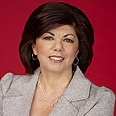
'Fired CNN editor not extremist'
Israelis acquainted with Octavia Nasr say her tweet in praise of deceased Hezbollah spiritual leader Grand Ayatollah Fadlallah was 'uncharacteristic'; claim her coverage of Israel was balanced for the most part. 'She's far from being pro-Israel, but she listened,' one of them says
WASHINGTON – About a month after veteran White House reporter Helen Thomas, 79, was forced to retire for saying Israelis should "get the hell out of Palestine," Octavia Nasr, 44, CNN's senior Middle East editor, was fired after she posted a note on Twitter expressing admiration for a late Lebanese cleric considered an inspiration for Hezbollah.
Lebanon's Grand Ayatollah Mohammed Hussein Fadlallah died last Sunday after a long illness. He was staunchly anti-American and linked to bombings that killed more than 260 Americans, a charge he denied.
The Atlanta-based Nasr worked at CNN for 20 years, starting as an assignment editor on the international desk. Her job was mostly off the air, but she occasionally would appear as an onscreen analyst during discussions of Middle Eastern news.
In a Twitter posting, Nasr said she was sad to hear of Fadlallah's death. She called him "one of Hezbollah's giants I respect a lot."
"Honest Reporting", a website that monitors Mideast media bias and "ensures that Israel receives fair worldwide press coverage," was the first to attack Nasr's statement.
"Is Nasr a Hezbollah sympathizer? This is disturbing enough given that the group is designated a terrorist organization by the US and is committed to the destruction of Israel. And which of Fadlallah's individual views does Nasr admire?" the website said.
"Is it Fadlallah's praise for the massacre of eight Israeli students at Mercaz Ha-Rav Yeshiva in Jerusalem on March 6, 2008? Or perhaps it was the fatwa (religious opinion) to the suicide bomber who attacked the US Marine barracks in Beirut in 1983. Fadlallah supported the seizure and hostage-taking at the US Embassy in Tehran in 1979, backed suicide bombing attacks in 2002, and praised Iran's efforts to build long-range missiles as the 'pride of the Islamic world' in 2008."
Nasr, who is married to a Christian Arab-Israeli, later said in a blog that she had been referring to Fadlallah's attitude toward women's rights. The cleric had issued edicts banning so-called "honor killing" of women and giving women the right to hit their husbands if attacked first.
She wrote that Fadlallah was "revered across borders yet designated a terrorist. Not the kind of life to be commenting about in a brief tweet. It's something I deeply regret."
Despite the apology, CNN's senior vice president for international newsgathering, Parisa Khosravi, said Wednesday that Nasr's credibility had been compromised.
Since then, the Internet has been flooded with reactions - some praising CNN for firing Nasr, and others claiming Thomas was forced to quit due to pressure exerted by pro-Israel elements such as AIPAC.
'Not exactly a fan of Zion'
So who is Octavia Nasr, and does she really support Hezbollah? "She is not exactly a fan of Zion, but she is approachable," an Israeli diplomat said. "Her views are far from being pro-Israeli, but she listens."
Israeli officials agree that Nasr does not genuinely support Hezbollah and accept her claim that she was merely praising Fadlallah for promoting equal rights for women in the Arab world.
Nasr, a mother of two who resides in Atlanta, was in touch with the local Israeli consulate, and her blogs regularly criticize Iran's involvement in Syria and Lebanon.
However, another Israeli said she expressed her "hostility" towards Israel in a "sophisticated manner".
"The Twitter incident was uncharacteristic of her. She fanatically maintained a semblance of objectivity, and hosted Israeli editors at the Atlanta headquarters," he said.
"Israelis who know her were surprised by the tweet. One of them described it as an 'inexplicable' comment."
Nasr began her career at the Christian television station LBC and joined CNN in 1990. As a journalist she covered the Gulf War in 1991, as well as every major event in the Middle East since then, including the war in Lebanon and the peace process.
She visited Israel several times throughout her career, including in 1995 to cover the assassination of prime minister Yitzhak Rabin.
In recent years CNN has been criticized over its coverage of conflicts, particularly in the Middle East. The network has set up a special monitoring division tasked with making certain its coverage remains fair and balanced.
Nasr, the recipient of many prestigious awards for her work in journalism, including the Edward R. Murrow Award for Continuing Coverage of the 2006 war in Lebanon, was apparently the victim of CNN's efforts to remain balanced at all costs.
"I think she covered Israel in a fairly balanced manner," said an Israeli who monitors CNN's coverage of the Middle East. "She was always professional, positive and balanced. She is not an extremist, and her tweet does not reflect her life story."
The Associated Press contributed to this report
- Follow Ynetnews on Facebook










